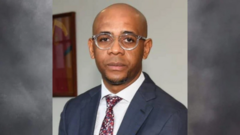Equatorial Guinea faces a scandal as leaked videos of Baltasar Ebang Engonga, a senior civil servant linked to the president, stir controversy and highlight the country's political tensions. As allegations of corruption surface, the implications on the factional struggles for power within the ruling elite become increasingly evident.
Political Intrigue Unveiled: A Scandal in Equatorial Guinea

Political Intrigue Unveiled: A Scandal in Equatorial Guinea
The leak of explicit videos involving a senior civil servant may expose deeper political machinations in the central African nation.
In Equatorial Guinea, a recently leaked compilation of explicit videos featuring senior civil servant Baltasar Ebang Engonga has sent shockwaves through the political landscape, unearthing a potential power struggle rooted in palace intrigue. Over the past two weeks, estimates suggest that between 150 and 400 videos have surfaced on social media, showcasing Engonga in compromising situations with various women, many of whom are connected to the elite powers of the nation.
Engonga, often referred to as "Bello" for his good looks, is the nephew of the country’s long-standing President Teodoro Obiang Nguema, who has maintained control since 1979. The president's administration is characterized by significant economic disparities, with a small, wealthy elite thriving while countless citizens endure poverty. Criticized for rampant human rights abuses, the government has faced scandals, including those related to members of the presidential family living extravagant lifestyles.
Circumstances surrounding the leaked footage raise questions about its origins. Engonga was arrested on charges of embezzlement shortly before the videos surfaced and was taken to the notorious Black Beach prison. Following his arrest, the videos began to leak, initially popping up on Telegram before rapidly spreading through WhatsApp. Internet monitoring seems to have begun as Vice-President Teodoro Obiang Mangue took action to curb the videos’ circulation, attributed to the concern for both familial and political reputations.
Political experts suggest that the leaks may serve as a calculated attack orchestrated by rivals in the elite circle. As a prominent figure in the government, Engonga’s fall appears to align with broader internal conflicts regarding succession. Observers speculate Mangue's motives hinge on his ambitions to secure the presidency, potentially seeking to eliminate rivals such as Gabriel Obiang Lima, who held a ministerial position in the oil sector for a decade.
Despite efforts to suppress the dissemination of the videos, their virality remains a major concern for authorities. Activists fear the scandal could lead to exaggerated governmental oversight of social media, threatening free expression in crucial political discourse. The attention generated by the scandal has sparked considerable interest beyond Equatorial Guinea, indicating that while the focus remains on the explicit content, the underlying issues of corruption and governance in the country persist, prompting discussions about the need for substantial systemic reform.
Notably, this scandal represents a broader commentary on the ethical decay within the country's political elite, with observers acknowledging Engonga's behavior as emblematic of a pervasive culture of corruption. Activists urge a focus on the societal issues plaguing Equatorial Guinea rather than the sensationalism of the scandal alone—advocating for greater scrutiny of the elite’s role amid widespread suffering among the populace.




















